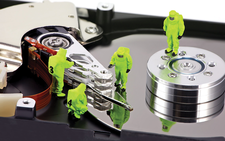Retrieving and setting hard drive parameters with hdparm
Disk Inspector

© Amy Walters, 123RF.com
Hdparm is the tool to use when it comes to tuning your hard disk or DVD drive, but it can also measure read speed, deliver valuable information about the device, change important drive settings, and even erase SSDs securely.
In 2005, Canadian Mark Lord developed the small hdparm utility [1] to test Linux drivers for IDE hard drives. Since then, the program has developed into a valuable tool for diagnosis and tuning of hard drives. For example, it tests the speed of hard drives and solid state disks, puts devices to sleep, and turns the energy-saving mode on or off. With modern devices, it can activate the acoustic mode and clean up SSDs. Before your first experiments with hdparm, you should read about safety concerns in the "Warning!" box.
Need for Communication
All reasonably new distributions already include hdparm in the basic installation. You only need to open a terminal and call up
hdparm -I /dev/sda | more
[...]
Buy this article as PDF
(incl. VAT)
Buy Linux Magazine
Subscribe to our Linux Newsletters
Find Linux and Open Source Jobs
Subscribe to our ADMIN Newsletters
Support Our Work
Linux Magazine content is made possible with support from readers like you. Please consider contributing when you’ve found an article to be beneficial.

News
-
New Linux Botnet Discovered
The SSHStalker botnet uses IRC C2 to control systems via legacy Linux kernel exploits.
-
The Next Linux Kernel Turns 7.0
Linus Torvalds has announced that after Linux kernel 6.19, we'll finally reach the 7.0 iteration stage.
-
Linux From Scratch Drops SysVinit Support
LFS will no longer support SysVinit.
-
LibreOffice 26.2 Now Available
With new features, improvements, and bug fixes, LibreOffice 26.2 delivers a modern, polished office suite without compromise.
-
Linux Kernel Project Releases Project Continuity Document
What happens to Linux when there's no Linus? It's a question many of us have asked over the years, and it seems it's also on the minds of the Linux kernel project.
-
Mecha Systems Introduces Linux Handheld
Mecha Systems has revealed its Mecha Comet, a new handheld computer powered by – you guessed it – Linux.
-
MX Linux 25.1 Features Dual Init System ISO
The latest release of MX Linux caters to lovers of two different init systems and even offers instructions on how to transition.
-
Photoshop on Linux?
A developer has patched Wine so that it'll run specific versions of Photoshop that depend on Adobe Creative Cloud.
-
Linux Mint 22.3 Now Available with New Tools
Linux Mint 22.3 has been released with a pair of new tools for system admins and some pretty cool new features.
-
New Linux Malware Targets Cloud-Based Linux Installations
VoidLink, a new Linux malware, should be of real concern because of its stealth and customization.
